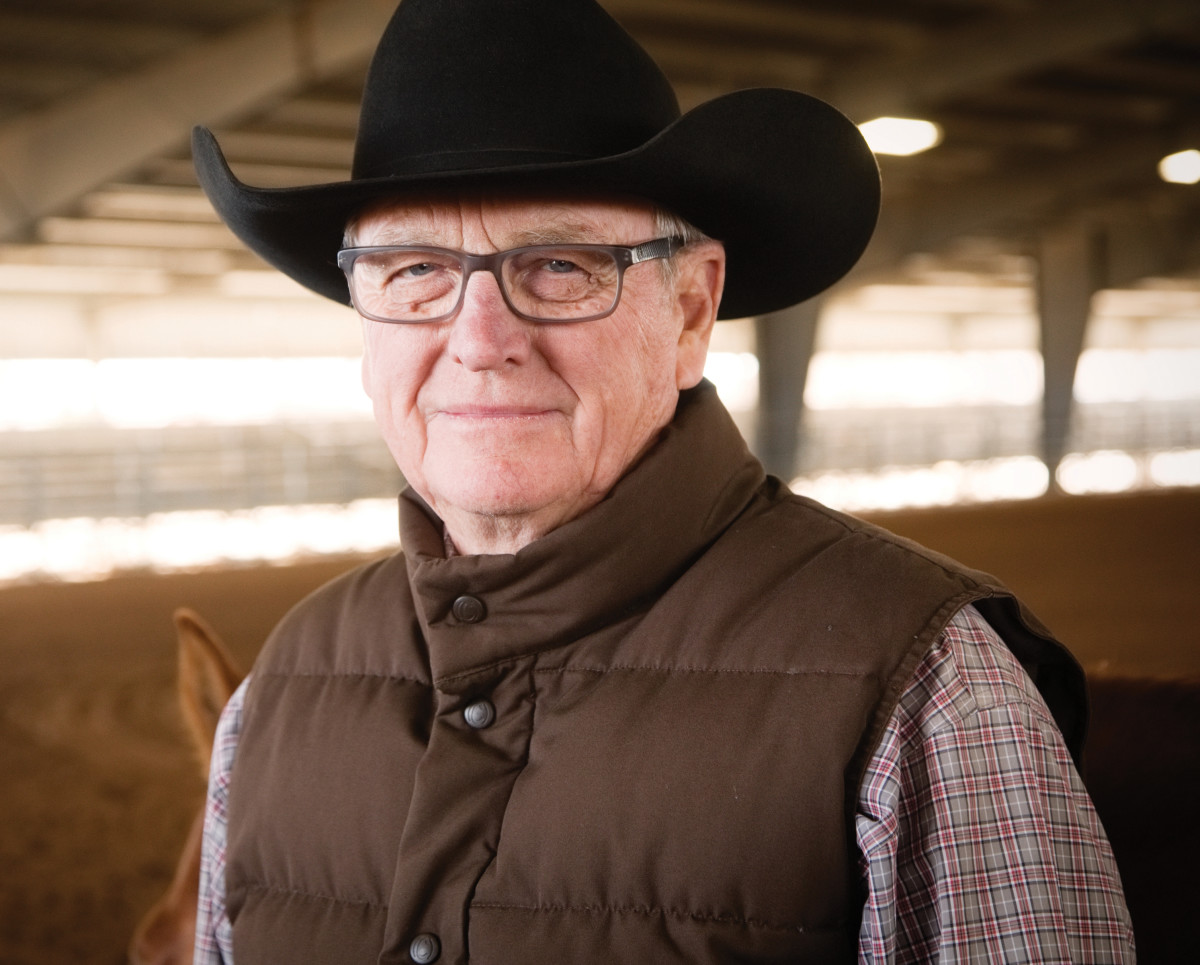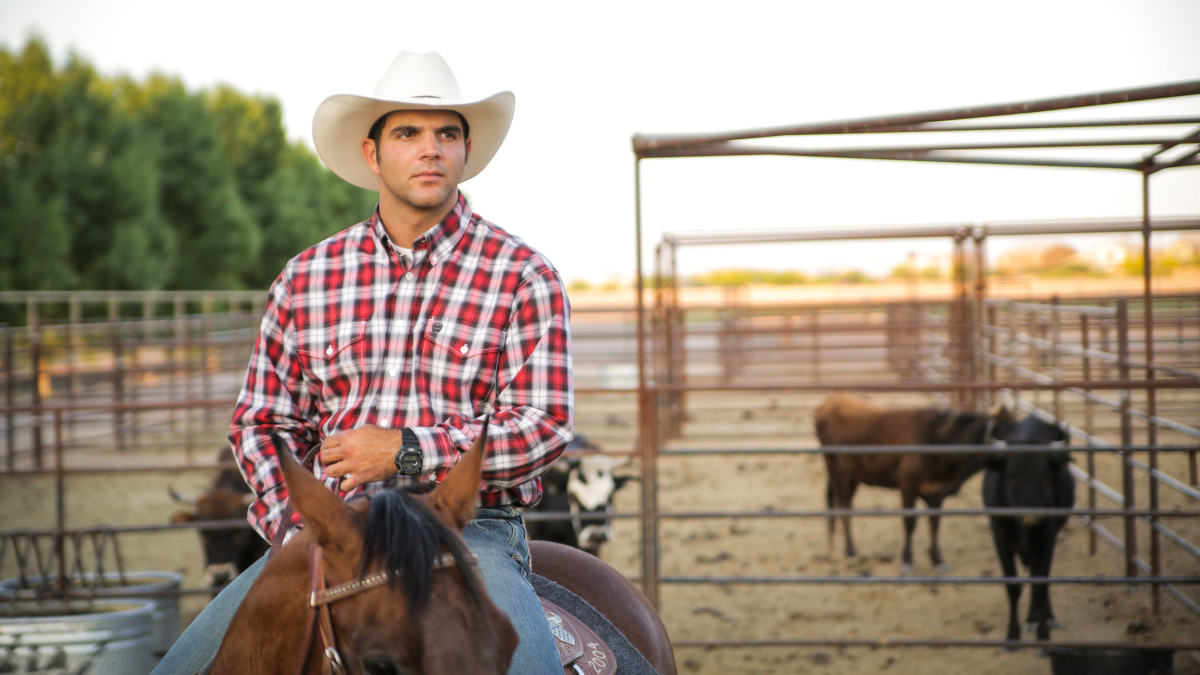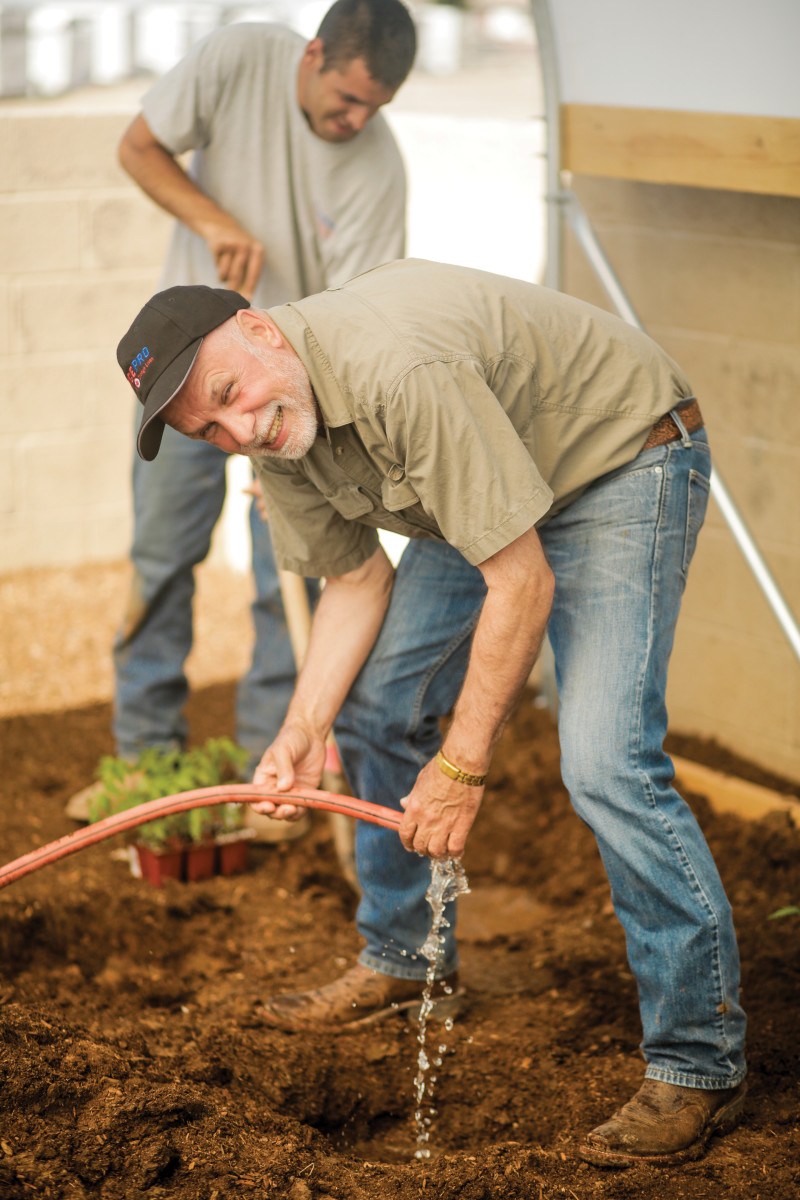Like any city kid who’d never been around horses, Bryan Davis couldn’t ride. He wanted to learn, so Johnny Haggard—the ranch manager of John Volken Academy Ranch in Gilbert, Arizona—put him on an old rope horse. As the horse moved, Davis dropped a rein, and then panicked and squeezed. The horse took off, and the runaway ended at the far end of the arena, when Davis fell off and separated his shoulder.
“I distinctly remember getting up off the ground and catching my horse, seeing the rein was broken, and then walking over to get a new set of reins,” recalls Davis, now 30. “I knew if I didn’t get back on the horse despite the pain, I never would again.”
Rope horses like this one didn’t just teach Davis how to ride—they saved his life.
Davis had the all-American childhood. He grew up in Spokane, Washington, with a couple of sisters, playing sports. His parents owned a bridal shop. When he was 21, a pesky bone infection near his jaw spurred doctors to prescribe him pain-killers for about six months.
These prescription pills, in conjunction with illegal opioids, snuffed out the lives of 47,600 Americans in 2017—making up about two-thirds of all drug overdose deaths that year, according to the Centers for Disease Control and Prevention. Opioids killed more people last year than car accidents or gun violence.

Nichole Carson Bonilla Photo
“I remember the first time I realized I was addicted,” Davis says. “It was such a unique experience, but there’s an element of panic. It’s indescribable to somebody who hasn’t gone through it.”
At 21, ignorant about addiction, Davis ran out of his prescription pills and tried to go to work the next day. Unfortunately, he was so sick, he couldn’t get out of bed.
“I called the nurse and said I don’t know why I’m so sick, and she told me I was having withdrawals and needed to pick up some more pills,” he recalls. “It was like a switch was flipped and all of a sudden not taking them was not an option. I couldn’t miss work; I couldn’t feel that sick.”
Even in rural towns, it’s easy to get opioids on the street. So that’s what Davis did. At that point, he was also introduced to heroin and methamphetamine. In fact, 80 percent of heroin users first abused prescription opioids, according to the Associations of Nonmedical Pain Reliever Use and Initiation of Heroin Use in the U.S.
“The evolution of an addict seems so gradual, while everyone else is watching the bottom fall out of your life,” Davis says.

Nichole Carson Bonilla Photos
Father figure
The ranch is one of three campuses of the John Volken Academy, a long-term addiction treatment program for men 18–34 years old, with a required minimum stay of two years. Most insurance policies only cover 14-day treatment programs, and 60- or 90-day inpatient programs can cost upward of $60,000.
But the John Volken Academy is free after a $5,000 intake fee, and students can stay up to five years. It’s funded by donations and the John Volken Foundation. Students live on-site and work full-time at large retail stores at the campuses in Vancouver and Seattle, and at the ranch in Gilbert.
That means Haggard’s entire staff are “students.” Rather than just doing time while staying clean, they’re learning horsemanship and hard work; how to set goals and develop healthy habits. Volken modeled this type of “work-based therapy” after an academy in San Patrignano, Italy.
“The mind is trying to rewire itself or to adjust itself, and it takes time,” according to Volken, who invested $6.2 million in the Gilbert ranch via his foundation. “No psychiatrist can speed it up; it just takes time.”
It also takes horses and Heel-O-Matics. That’s thanks to Johnny Haggard—a 5.5 heeler—and his wife, Debbie, who are “the most affectionate and hard-working people I’ve ever met in my life,” according to Davis.
The Haggards have been married 48 years and had raised five kids before Johnny was tapped to manage the ranch in 2012. Team roping has always been part of the family. All four of Haggard’s sons rope around Arizona, where Haggard enters local jackpots and World Series ropings, despite turning 70 this year. It’s tough to find time, however, since he works seven days a week at the ranch.
The 40-acre property boasts a covered roping arena and an outdoor roping arena—both with seating and concessions—two other multi-purpose arenas, warm-up pens, big round pens and a hot walker. The students built it all. They host team ropings every Friday night and several weekends.
In addition, they’re saddled with the full care of boarding 125 horses daily, including feeding, pen-cleaning and turnouts three times a week. They also work in the Ranch Store selling ropes, grain and hay for Debbie, who acts as “ranch mom.”

Equine therapy
There are no doctors here; no counselors. Just Haggard and the program director, who manages the addiction recovery program and the students’ progression through the program—and he’s a graduate. It’s about sunshine, animals and dirt. Students work on the ranch nine or 10 hours a day, six days a week, often beginning at 4 a.m. to beat the summer heat. Just about every weekend, Haggard and his young men host a team roping, barrel race, or senior, junior or amateur rodeo. The men drive tractors, sell concessions and work chutes.
“The first four months of the program, they don’t do much more than muck stalls,” Haggard says. “It takes that long for their minds to clear.”
Addiction strikes more Americans than does heart disease, diabetes or cancer, according to a Columbia University study. Despite the fact that 40 million people have this disease—proven by science to stem from a condition of the brain—addicts are misunderstood as willful criminals or morally weak. Hard work helps pull them out of the shame and isolation cycle.
“It’s also a lesson in humility,” says Davis. “If you can’t clean stalls with a good attitude, they don’t let you do much else. When guys first get there, they’re talking about how big and bad they were and how hard they went. Over time, they talk about that less and less, because it’s not who they really are. Egos can interfere, but we have a running joke at the ranch: We don’t end up here by coincidence.”
Looking back, he thinks Haggard was essential to his recovery because of what he learned about himself from working with horses—the little adversities and little victories that add up over time. Like the other students, he struggled at first, pitching manure. But as former student Nicholas Mott told a reporter, “This place … makes you uncomfortable, and that’s where a lot of the change process is taking place.”
Roping some recovery
Chase Smoot was about to turn 15 when he drank for the first time with some buddies. Two weeks later, he started using heroin.
“My life spiraled down and down,” recalls Smoot, who’d gone unsuccessfully to a 90-day program before arriving at the ranch when he was 21. “I’d climb out and just spiral down again, for probably seven years.”
Smoot, who’d spent his childhood on a northern Utah ranch, fondly recalls his time at the John Volken Academy Ranch, being out in the arena for a few hours in the evenings, playing music and chasing the Heel-O-Matic with eight or 10 other students. They only had a couple of horses—one old donated head horse and a former Western pleasure horse they’d converted. The boys who were better hands could borrow Haggard’s personal horses.
“I think of Johnny like my grandpa,” says Smoot. “His style of teaching you to rope was kind of comedic, but when he really wanted to teach, he’d definitely ship you into shape and say, ‘Chase, you’re doing it wrong; you’re going to the horn too quick!’”
Smoot says the men pull that dummy for each other five nights a week, because Haggard won’t let them rope live steers.
“They need to concentrate why they’re here,” says Haggard, whose own escape is to practice on live steers with his son, Chad. “You know as well as I do that team roping is addictive. We don’t want to send them out of here with a bigger addiction!”
Not to say it can’t happen, however. Smoot got so good on the Heel-O-Matic and loved it so much that, on the very first day he graduated, he went to the neighbor’s house to borrow a horse and rope three live steers, then came immediately back and entered that day’s jackpot at the ranch.
“If not for the ranch, I wouldn’t have made it, honestly,” says Smoot, who now lives two blocks away and owns his own excavation and demolition company. “There aren’t a lot of programs that give you the opportunity to go work with your hands every day. I was always welding and fixing fence. It’s a good place.”
As for Davis, his shoulder healed (he refused pain medication), and he went on to learn to rope and give lessons to the other students. And he camped on an outlaw colt of Haggard’s every day during his last six months.
“As much as I helped that colt overcome his attitude problems, he helped me put that final tune-up on myself,” Davis says. “He taught me to react appropriately. You know, being around horses, the worst thing you can do is overreact.”
Tending the horses teaches the men they can cope with things, without drugs and alcohol. They can take things in stride. Most of them realize, as Davis said, that it’s actually a way of life.
“When animals become your responsibility, your priorities adjust, and that’s just what you do,” says Davis, who worked for an equine veterinarian after graduation. “It becomes who you are.”
It’s a far cry from when students first arrive. Davis was 25 in 2014 when his mother heard about the Gilbert ranch and put him on a plane. He was homeless and had been found near death on a Spokane street after an overdose. That was after he’d already been to six short-term rehab programs.
According to the U.S. National Institute on Drug Abuse, it takes at least 90 days to give an addicted person enough time to recover. Short-term programs have a success rate of 16 percent, while more than two-thirds of the Ranch graduates stay clean and sober. They arrive with no hope, likely to die by overdose or suicide.
“They’re lost,” Haggard says. “They just wander around. Parents aren’t allowed to visit for seven months, so at that point they come down to visit, they’re just shocked. You can see the hope in their eyes that maybe they’ll get back the son they always had.”
Parents aren’t the only ones who don’t recognize the group of tan, strong, clear-eyed and motivated men.
“It’s funny, people come here to rope or run barrels and look around and say, “Where are the drug addicts?” Haggard says. “These young men are clean-cut and just really good people who made some really bad choices along the way. The average age they got on this wrong path was 13.”
Giving back
At an age when most men are retired, Johnny Haggard feels like he’s doing what he should.
“When somebody wants to try, it makes you really want to help them,” he explains. “Seeing these kids graduate and get married and start their lives makes all the long hours worth it.”
Most of the graduates are now working and living within a 20-mile radius of the ranch. Debbie texts them every Sunday, and they text back and often visit.
Today, Smoot hires students to work for him off-site, and still ropes the dummy there from time to time. Just before he graduated, Fox News came out to do a story.
“This young reporter was beautiful, and when she left, Chase said, ‘I’m getting a date with her,’” recalls Johnny, laughing. “I said, ‘You don’t have a chance!’ He graduated, and 30 days later asked if he could borrow my horses to take her on a ride. Last March they got married.”
Smoot and his wife are building a house, after which he plans to find himself some good heel horses and start entering. He’s just one of literally hundreds of success stories, all due to founder John Volken, 78, who visits every month.
“He has an apartment here in the building with the men’s dorm,” says Haggard. “He gets a shovel and digs holes for trees and whatever needs to be done.”
Volken knows what it’s like to start from nothing. Born in communist Germany, his father died when he was three and his mother put him and his two brothers in an orphanage. In 1960, at the age of 18, he immigrated to Canada with a hundred dollars in his pocket. He took odd jobs, learned English and began selling a few pieces of furniture in 1981. Twenty years later, he had 160 stores and annual sales of $200 million.
Soon, he began to remember the orphanage and wanted to make a difference in an area of social neglect. Fifteen years ago, he sold the furniture company to form the John Volken Foundation, which funds his three addiction recovery campuses and Lift The Children, which helps impoverished African kids.
“I believe that once we have provided for our families, we should then work for the good of all; whether it be the arts, amateur sports, public office, whatever you choose,” Volken has said, noting that he’s been motivated by Matthew 25:40 in the bible: “In as much as ye have done it unto one of the least of these my brethren, ye have done it unto me.”
As for Davis, he can recount with no emotion his trips to the ER, his homeless status while all his bridges lay burning, or the day he knew he’d die without the right kind of help. But it’s only when he thinks about Mr. Volken that he breaks down.
“I love hearing his story even more than I love mine,” says Davis. “Just the life he’s lived. Not many people are capable of that. But what that man has done for hundreds and hundreds of people whom no one else was willing to help? I mean, it’s truly a blessing. There aren’t enough people like him in this world.”
Learn more about the John Volken Academy Ranch at jvaranch.org or by calling (855) 592-3001.
In Phoenix, consider competing there at ropings produced by The Roping Company (ropefast.com; 480-215-3180), and Double C Ropings (602-390-4130), or book hydrotherapy sessions for your horse by calling (480) 895-9975. Interested in donating to the program?
Visit jvadonate.com.








